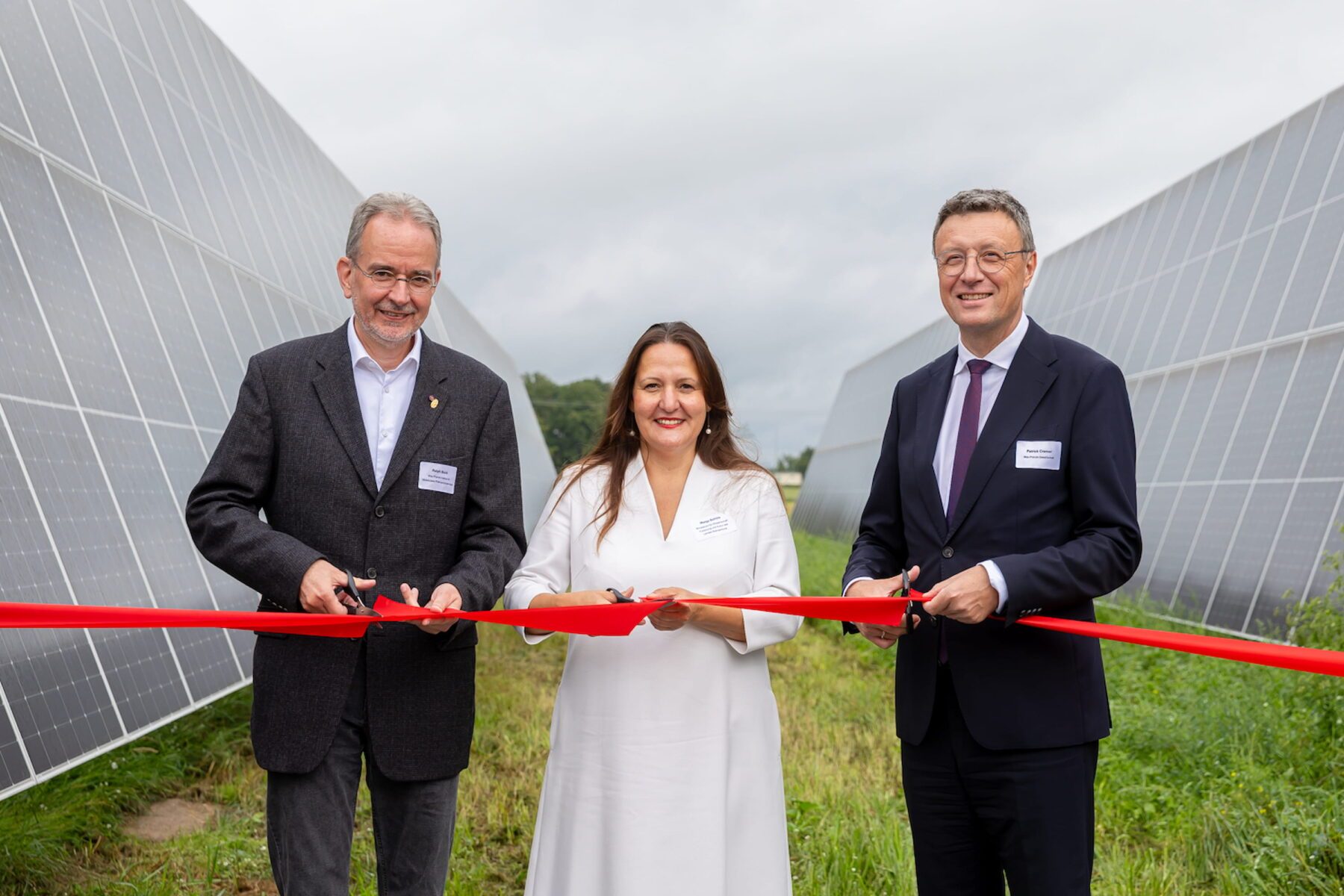
Max Planck Campus at Potsdam Science Park Inaugurates New Photovoltaic Systems
MPI-MP | On 5 September 2025, Sustainable Energy Transition for Cutting-Edge Research: The Max Planck Campus at Potsdam Science Park inaugurated its new photovoltaic systems with a ceremonial event. Alongside representatives from the scientific community, guests from politics and society attended, including Brandenburg’s Minister of Science, Dr Manja Schüle, and the President of the Max Planck Society, Professor Dr Patrick Cramer.
At the heart of the event was an innovative agri-photovoltaic installation on the experimental fields of the Max Planck Institute of Molecular Plant Physiology. Covering an area of around 6,000 square metres, it will generate green electricity for the three neighbouring research institutes. The installation is complemented by an additional rooftop solar system at the Max Planck Institute for Gravitational Physics (Albert Einstein Institute). Together, they significantly increase the campus’s energy independence.
“Our measures to reduce CO₂ emissions are not only an ecological contribution but also safeguard our research against rising energy costs and potential supply shortages,” emphasised Professor Dr Ralph Bock, Managing Director of the Max Planck Institute of Molecular Plant Physiology. “Our goal is to demonstrate how forward-looking research and sustainability can be successfully combined.”
Professor Dr Patrick Cramer, President of the Max Planck Society, highlighted the project’s exemplary character: “The opening of the solar park on the Max Planck Campus vividly demonstrates that we can take tangible action on climate protection together. Thanks to the support of the State of Brandenburg and close local cooperation, the Max Planck Institutes in Potsdam-Golm will now meet part of their energy needs with solar power. This sets an example not only for other Max Planck Institutes, but far beyond.”
Comprehensive Energy Strategy
The photovoltaic systems are part of a long-term energy strategy at the Golm site. As early as the 1990s, two highly efficient gas power plants with an efficiency rate of nearly 80 percent were installed here. Since 1999, a geothermal system with 160 probes has further supplemented the energy supply.
In addition to expanding renewable energy, the institutes are consistently committed to energy efficiency measures:
- Replacement of old ultra-low temperature freezers, achieving energy savings of up to 65 percent
- Comprehensive conversion to LED lighting
- Full LED lighting in greenhouses since 2022
These measures are largely supported by the State of Brandenburg and co-financed by the Max Planck Society.
Brandenburg’s Minister of Science, Dr Manja Schüle, commented: “With the commissioning of the agri-photovoltaic system, something has been created on 6,000 square metres that represents far more than the sum of its panels and modules: here, energy, science and biodiversity grow side by side. This is a visible sign of a new, sustainable research culture! With these investments, we are not only strengthening the energy resilience of the three Max Planck Institutes in Golm, but also securing Brandenburg’s position as a hub of innovation for the future. The €2.7 million provided by the State to support this project and other energy-efficiency measures is money well spent.”
Contribution to Climate Protection
With the new installations and accompanying measures, the three Max Planck Institutes in the Potsdam Science Park in Golm will be able to save over 600 tonnes of CO₂ annually. In addition, a wildflower meadow is being established on the site, with 1,000 square metres preserved permanently – a valuable contribution to promoting biodiversity in the region.
Press Contact
Rebecca Vaßen
Press and Public Relations Officer
Max Planck Institut of Molecular Plant Physiology
Potsdam Science Park
Am Mühlenberg 1
14476 Potsdam
Germany
Further detail on the MPI-MP website